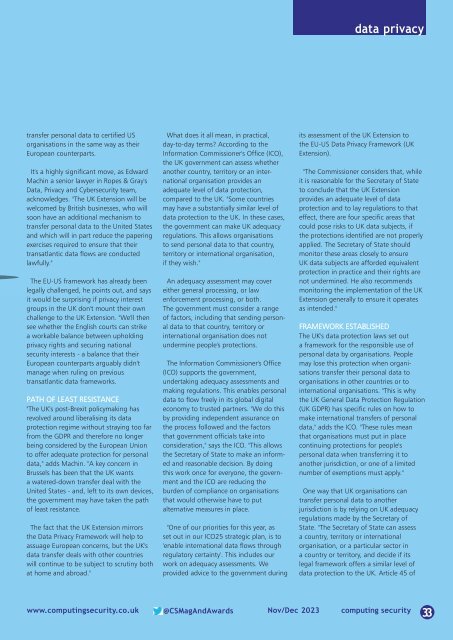CS Nov-Dec 2023
You also want an ePaper? Increase the reach of your titles
YUMPU automatically turns print PDFs into web optimized ePapers that Google loves.
data privacy<br />
transfer personal data to certified US<br />
organisations in the same way as their<br />
European counterparts.<br />
It's a highly significant move, as Edward<br />
Machin a senior lawyer in Ropes & Gray's<br />
Data, Privacy and Cybersecurity team,<br />
acknowledges. "The UK Extension will be<br />
welcomed by British businesses, who will<br />
soon have an additional mechanism to<br />
transfer personal data to the United States<br />
and which will in part reduce the papering<br />
exercises required to ensure that their<br />
transatlantic data flows are conducted<br />
lawfully."<br />
The EU-US framework has already been<br />
legally challenged, he points out, and says<br />
it would be surprising if privacy interest<br />
groups in the UK don't mount their own<br />
challenge to the UK Extension. "We'll then<br />
see whether the English courts can strike<br />
a workable balance between upholding<br />
privacy rights and securing national<br />
security interests - a balance that their<br />
European counterparts arguably didn't<br />
manage when ruling on previous<br />
transatlantic data frameworks.<br />
PATH OF LEAST RESISTANCE<br />
"The UK's post-Brexit policymaking has<br />
revolved around liberalising its data<br />
protection regime without straying too far<br />
from the GDPR and therefore no longer<br />
being considered by the European Union<br />
to offer adequate protection for personal<br />
data," adds Machin. "A key concern in<br />
Brussels has been that the UK wants<br />
a watered-down transfer deal with the<br />
United States - and, left to its own devices,<br />
the government may have taken the path<br />
of least resistance.<br />
The fact that the UK Extension mirrors<br />
the Data Privacy Framework will help to<br />
assuage European concerns, but the UK's<br />
data transfer deals with other countries<br />
will continue to be subject to scrutiny both<br />
at home and abroad."<br />
What does it all mean, in practical,<br />
day-to-day terms? According to the<br />
Information Commissioner's Office (ICO),<br />
the UK government can assess whether<br />
another country, territory or an international<br />
organisation provides an<br />
adequate level of data protection,<br />
compared to the UK. "Some countries<br />
may have a substantially similar level of<br />
data protection to the UK. In these cases,<br />
the government can make UK adequacy<br />
regulations. This allows organisations<br />
to send personal data to that country,<br />
territory or international organisation,<br />
if they wish."<br />
An adequacy assessment may cover<br />
either general processing, or law<br />
enforcement processing, or both.<br />
The government must consider a range<br />
of factors, including that sending personal<br />
data to that country, territory or<br />
international organisation does not<br />
undermine people's protections.<br />
The Information Commissioner's Office<br />
(ICO) supports the government,<br />
undertaking adequacy assessments and<br />
making regulations. This enables personal<br />
data to flow freely in its global digital<br />
economy to trusted partners. "We do this<br />
by providing independent assurance on<br />
the process followed and the factors<br />
that government officials take into<br />
consideration," says the ICO. "This allows<br />
the Secretary of State to make an informed<br />
and reasonable decision. By doing<br />
this work once for everyone, the government<br />
and the ICO are reducing the<br />
burden of compliance on organisations<br />
that would otherwise have to put<br />
alternative measures in place.<br />
"One of our priorities for this year, as<br />
set out in our ICO25 strategic plan, is to<br />
'enable international data flows through<br />
regulatory certainty'. This includes our<br />
work on adequacy assessments. We<br />
provided advice to the government during<br />
its assessment of the UK Extension to<br />
the EU-US Data Privacy Framework (UK<br />
Extension).<br />
"The Commissioner considers that, while<br />
it is reasonable for the Secretary of State<br />
to conclude that the UK Extension<br />
provides an adequate level of data<br />
protection and to lay regulations to that<br />
effect, there are four specific areas that<br />
could pose risks to UK data subjects, if<br />
the protections identified are not properly<br />
applied. The Secretary of State should<br />
monitor these areas closely to ensure<br />
UK data subjects are afforded equivalent<br />
protection in practice and their rights are<br />
not undermined. He also recommends<br />
monitoring the implementation of the UK<br />
Extension generally to ensure it operates<br />
as intended."<br />
FRAMEWORK ESTABLISHED<br />
The UK's data protection laws set out<br />
a framework for the responsible use of<br />
personal data by organisations. People<br />
may lose this protection when organisations<br />
transfer their personal data to<br />
organisations in other countries or to<br />
international organisations. "This is why<br />
the UK General Data Protection Regulation<br />
(UK GDPR) has specific rules on how to<br />
make international transfers of personal<br />
data," adds the ICO. "These rules mean<br />
that organisations must put in place<br />
continuing protections for people's<br />
personal data when transferring it to<br />
another jurisdiction, or one of a limited<br />
number of exemptions must apply."<br />
One way that UK organisations can<br />
transfer personal data to another<br />
jurisdiction is by relying on UK adequacy<br />
regulations made by the Secretary of<br />
State. "The Secretary of State can assess<br />
a country, territory or international<br />
organisation, or a particular sector in<br />
a country or territory, and decide if its<br />
legal framework offers a similar level of<br />
data protection to the UK. Article 45 of<br />
www.computingsecurity.co.uk @<strong>CS</strong>MagAndAwards <strong>Nov</strong>/<strong>Dec</strong> <strong>2023</strong> computing security<br />
33

















